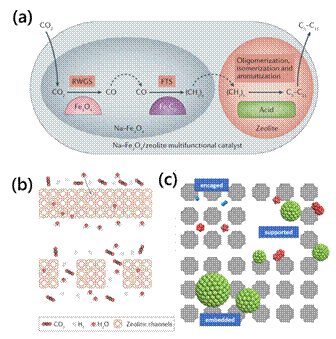Yi Li 1,2 and Jihong Yu 1,2
1State Key Laboratory of Inorganic Synthesis and Preparative Chemistry, College of Chemistry, Jilin University, Changchun, China.
2International Center of Future Science, Jilin University, Changchun, China.
Zeolites are a family of microporous crystalline materials, which, since the 1940s, have had an indispensable role in the chemical industry as catalysts, adsorbents and ion exchangers. Advances in synthetic methodologies and characterization techniques have enabled the fabrication of new zeolitic materials, with emerging applications in diverse areas. By tuning their porous architectures, framework compositions and crystal morphologies, coupled with the incorporation of exotic active species, zeolites and zeolite-based materials have exhibited unprecedentedly high performance in many challenging processes. In this Review, we focus on the high-efficiency catalytic production of industrially important hydrocarbons and oxygenates using non-petrochemical feedstocks, energy-efficient separations of hydrocarbon mixtures that are difficult using conventional methods and materials, and host–guest assemblies that exhibit physical properties unprecedented to either the zeolite hosts or free guest species. Finally, we provide our perspectives on future directions for the development of zeolitic materials to meet the ever-growing demands from diverse fields.

Figure 1
(a) Reaction scheme for CO2 hydrogenation to gasoline over Na–Fe3O4/ZSM-5 catalyst.
(b) Separation properties of a water-conducting membrane made from defect-free Na-A zeolite.
(c) Active exotic species in zeolite crystals
Related links:https://www.nature.com/articles/s41578-021-00347-3#article-info